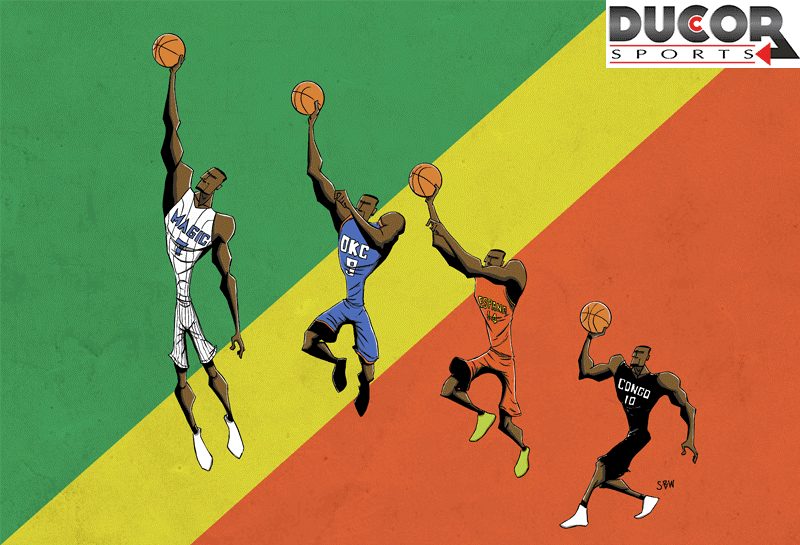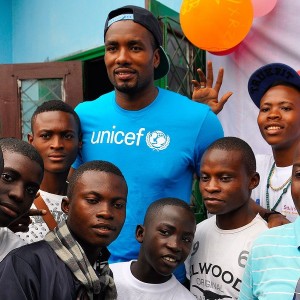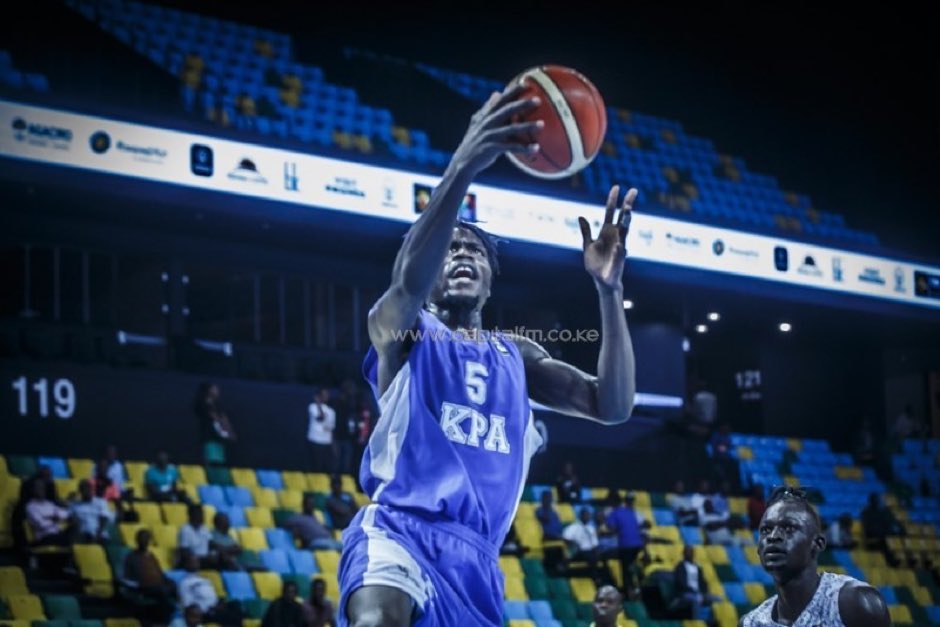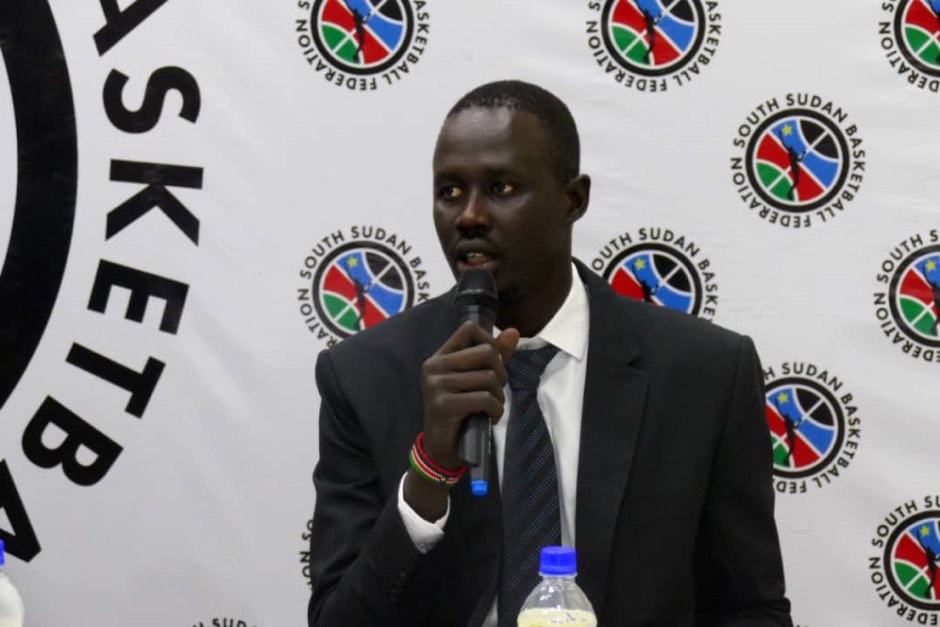
Life at the Center
Serge Jonas Ibaka Ngobila was born in a basketball family. Desire Ibaka, his father, played for the Republic of Congo, and his mother, Amadou Djonga, played for the Democratic Republic of Congo. Both countries straddle the Congo River into the center of Africa. At the age of seven, Ibaka started playing basketball casually in the playgrounds of Brazzaville. “I played every day,” Ibaka told NewsOk. “If there was a day that I couldn’t play, I felt so bad, like something was missing that day.”
Although both his parents played on the national stage, their sports careers did not translate into a better life for their family.
In his “Son of Congo” documentary, Ibaka describes his childhood as characterized by poverty and loss. “Here with $200, you can live nice, and you’ll be happy. But a lot of people here, they do not have that. When I was growing up here. I did not,” he offered.
When Ibaka was eight, his mother passed away due to natural causes. Following his mother’s death, a series of unfortunate events occurred. When Ibaka was nine, civil unrest started brewing. For the past century and a half, the region had been unstable due to military conflict. Unfortunately for Ibaka, his family was caught in the middle of the deadliest one of them all, the Second Congo War. Reportedly, it was the largest war in modern African history; it claimed five million lives. Ibaka’s family fled to safety.
“There a lot of things I don’t really love to talk about right now,” he said. “It’s some ugly memories, not only for me, for everybody.”
Further, he recalled: “We had no electricity, no food and we was hearing bombs. We were calling that ‘music’ because we were hearing that every second, every minute, all day. 24-hours-non stop.
[perfectpullquote align=”full” cite=”” link=”” color=”” class=”” size=””]“When you see a lot of people die, your friends, your family… die from sickness because they didn’t have medicine.”[/perfectpullquote]
In 2001, on the family’s return to Brazzaville, his father was captured as a suspected anti-government rebel after crossing the Congo River. Ibaka would drop out of school for two years because there was no one to pay his school fees. He attempted to live with his uncles but was thrown out on the street to fend for himself. After spending some time on the street, his grandmother Christine Djonga, took him in.
In the Face of Adversity
“When I was growing up, I was very focused, and I said, ‘the way things are going right now, I need to go play basketball abroad,’” he recalled.
It was difficult because it meant waking up at 4 A.M. to run, with no food and under severe conditions. However, Ibaka told himself not to give up on basketball. “Don’t give up; you’re gonna make it,” he told himself. “Until there is nothing else I can do, I will never stop trying.”
At 16, Ibaka started to play local club basketball that ultimately lead him to play for the national team. That’s how the world began to notice.
“The first time we hear about Serge, it was September 2006. He played the Afro Basket Under 18 Championship. He was the top scorer, top rebounder, top blocker,” said Pere Gallego, Ibaka’s Spanish agent. “We just went there to talk to him about coming to Spain.”
Gallego would express in an email to NewsOk: “I’ve been in 12 African countries, scouting hundreds of players and never have seen anybody like him, After watching him play, (I noticed) his attitude and personality. He was a fighter, a winner, a leader. And after talking to him, his mind and focus (stood out). He was a hard worker and ready to sacrifice for achieving his dreams.”
From Congo to France, to Spain, and to the USA in two Years
After convincing his father, Ibaka moved to France and then to Spain. He showed quick learning ability and started to prove himself. Before long, he began to play in the Spanish second division league. First, he joined L’Hospitalet where he met Jordi Vila Sanchez (Ibaka’s current communications manager) who assisted him with the transition. Then, he played with DKV Joventut from 2006-07 where he averaged 13.3 points, nine rebounds, and 1.7 blocks.
Ibaka kept on rising. Soon after, he was invited to the Adidas Nations camp in New Orleans, a program assembling the top 18-and-under players from around the world. His accomplishments would put him on the NBA Radar.
In his vertical jump test, he jumped higher than the measuring pegs could record, so they had to raise them up even more. The news reached Sam Presti, the General Manager of the Oklahoma City Thunder who at first, was particularly impressed with his athletic ability, and then got to like him even more after getting to know him.
“All of the information that we were able to gather,” Presti said, according to NewsOK. [perfectpullquote align=”full” cite=”” link=”” color=”” class=”” size=””]”About his focus, his work ethic, and just his story, coming from where he came from intrigued us that this would be a guy that would fit the kind of profile that we wanted to add to our team.”[/perfectpullquote]
On July 9th, 2008, Ibaka arrived in New York for the Draft Day. He was 18 years old and nervous. “Serge was shaking. He was really nervous,” said Vila as per the Son of Congo documentary.
Ibaka added: “And when they start calling number one, number two, number three… what happens if they don’t pick me? Man, so embarrassing for me. I start praying, ‘please can I hear my name?’”
And then it happened, the Presti selected Ibaka with his 24th pick.
Flying Air Congo
Ibaka maintained a low profile for his first two years in the NBA, growing steadily under the radar. However, things changed in early 2011 when his teammate, Kevin Durant told him that his dream to enter the dunk contest had come true. In excitement, Ibaka promised to make Africa proud.
Then, on All-Star Night. A night that promised rim-rattling and sights of greatest high-flyers of all time. Reggie Miller, a hall of fame player and now NBA Basketball Analyst, saw something special coming and expressed joyfully:
[perfectpullquote align=”full” cite=”” link=”” color=”” class=”” size=””]“I love it! I love it! It’s all about presentation! Win the crowd, you win your freedom!”[/perfectpullquote]
he said as Ibaka made his way to the court while engaging the crowd, followed by a team of ushers carrying flags with the words, “NBA Africa.”
With the support of former teammates in James Harden, Russell Westbrook, and Durant, Ibaka put on a dunk show to remember.
First, he launched his contest by launching off from behind the free throw line, a task that is particularly challenging for a player of his height. Miller was quick to point out that, “Dr. J didn’t even do that. Nor Micheal Jordan.” It was a legitimate, behind-the-line free throw dunk and possibly the longest in league history.
In his follow-up dunk, he gave the commentators a good laugh when a seemingly lost kid told the host that his toy got lost and somehow ended up on the basketball rim. The child reached out to Ibaka and asked, “can you please go get it?”
“Sure, give me 5 seconds,” Ibaka replied.
Then this happened:
Considering that Ibaka’s entry to the NBA wasn’t highly televised. This moment may have been Ibaka’s grand arrival in the minds of NBA fans around the world. It was a milestone in the growing legend of Air Congo.
The Journey so Far
Today, Ibaka has played seven seasons for the Oklahoma City Thunder. At OKC he helped the team reach five playoffs and a finals appearance in 2012. In a Sports Illustrated article, Ibaka shared that: “I’m really going to miss Oklahoma City… Obviously, I’m disappointed that our group was never able to bring the city a championship, but I had some great times there, and so many moments I’ll never forget.”
In his current season, he plays for the Orlando Magic. As per the sports illustrated article, “I’m thrilled to be in Orlando. I know that might sound crazy to some people, that I’m excited to go from a contender like the Thunder to a rebuilding team, one that hasn’t made the playoffs in four years, but playing now for Frank Vogel, a coach who prides himself on defense, is very exciting for me. We have a core of like-minded, young, athletic players, which is going to be very fun. We are an old-school, smash-mouth team, and I can’t wait to don a Magic uniform on opening night.”
Most significant about his road so far, however, is his contribution to the Congo. In his interview with USA Today, Ibaka was asked how many people he supports financially in Congo and answered: “So many people. I can’t really give you a number, but it’s a lot of people. I have my mother’s family, my father’s family… And that’s the way it is. That’s the way it is in Africa. It’s always been like this for me and it’s not going to change.”
Other than supporting his family, Ibaka has gone out of his way to refurbish two orpharnages. In his documentary, we see him looking helplessly at sick children at a hospital at one point. As per the USA Today article, he said: “That left me thinking for a long time. I was talking with Jordi and I was like, ‘We have to do something about this, we have to help these kids.’ I started to think about what I could do to improve their situation. I never expected to see kids in that situation. I was expecting to see sick kids and went there with hopes of doing what I could for them. But then you get there and see these kids just there, lying on the ground. It was difficult to see.” He eventually took some food and pledged to bring back medicine.
While Ibaka may not be able to save every person in need, he believes that his story can inspire anyone.
In an interview with Yahoo Sports, Ibaka tells Adrian Worjnarowski: “I tell them all: If can make NBA player, if I play in the NBA, that’s means anything is possible. When I was in Congo, basketball in Congo was nowhere like today there. I didn’t watch the NBA. I knew two players. Michael Jordan. Magic Johnson. Oh, maybe [Dennis] Rodman, too. Only know a few teams. That’s all I know. We did not see basketball. I didn’t know there was an NBA draft.
“But in my mind, I was always telling myself, one day, ‘I’m going to be in professional basketball.’ And I believed it. One day, I will. I believe this every day. I think about this every day. I was going to do whatever I had to do to be there. And it comes true.”
(Photo Credit: Yahoo Sports)
Illustration by Wendo











